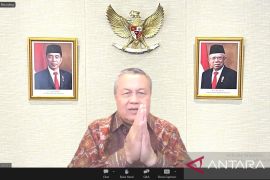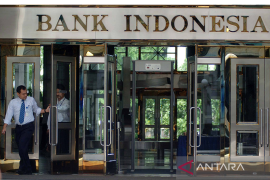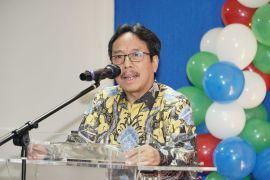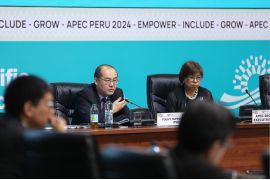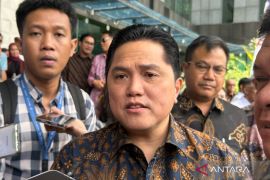If the seaweed produced by the local farmers has met the needed economic scale, PT Argarindo will then build a seaweed processing industry thereJakarta (ANTARA News) - In an effort to step up the pace of economic development in disadvantaged regions, the government will intensify seaweed cultivation at 33 districts in seven provinces.
Scientific research has demonstrated that seaweed, which has always been part of the staple diet of people living near the sea, has many health benefits.
Seaweed contains sufficient amounts of all minerals required by human beings such as calcium, sodium, magnesium, potassium, iodine, iron, and zinc.
According to scientific research, seaweed can also regulate hormones, enrich the blood stream, stimulate the metabolism, promote youthful skin color, and help to warm the body to promote mental youthfulness.
Therefore, State Minister for Disadvantaged Regions Ahmad Helmi Faisal Zaini said here on Thursday that five ministries and the Investment Coordinating Board (BKPM) would cooperate to intensify seaweed cultivation in the 33 districts that have been categorized as disadvantaged regions.
The five ministries to cooperate in the effort are those of disadvantaged regions, maritime affairs and fisheries, industry, trade, and cooperatives and small and medium enterprises.
Ahmad Helmi said the cooperation among the five ministries and BKPM in the seaweed cultivation program in seven provinces was marked with the signing of a memorandum of understanding (MoU) before Vice President Boediono here on Thursday.
Central Sulawesi and Maluku are among the provinces where the government will focus on seaweed cultivation to step up the local people`s welfare and economy.
Head of Central Sulawesi Marine Affairs and Fishery Office, Hasanuddin Atjo, said in the provincial city of Palu on Thursday that Marine and Fisheries Affairs Minister Fadel Muhammad would soon proclaim Morowali district as seaweed minapolitan area.
As a result, Morowali district in Central Sulawesi is projected to be the biggest seaweed producing district in Indonesian in the years to come.
Hasanuddin Atjo said Morowali district whose territory includes most of Tolo Bay is now the largest seaweed producer in Central Sulawesi.
Therefore he noted that Central Sulawesi government would turn Tolo Bay into seaweed development center, projected to enable the province to realize its plan to increase seaweed production to 1.95 million tons by 2014.
"Tolo Bay produces around 70 percent of Central Sulawesi`s overall seaweed production of 70,000 tons," Hasanuddin Atjo said.
According to Hasanuddin, Tolo Bay would be turned into a seaweed development center in Cenral Sulawesi because the area had the superior quality of cottoni and glacilaria types of seaweed.
Therefore, Morowali district where the bay is located has a great commitment to developing the seaweed commodity for the local people`s welfare following the presence of PT Argarindo Bogatama Indonesia in its operation to cultivate gracilaria type of seaweed in the district.
"If the seaweed produced by the local farmers has met the needed economic scale, PT Argarindo will then build a seaweed processing industry there," Hasanuddin said.
He added that to support a large scale development of seaweed at Tolo Bay, the Maritime Affairs and Fisheries Ministry will allocate Rp3 billion of funds in 2011 as a working capital for the seaweed cultivators in Central Sulawesi.
"This is the largest funding allocation for the seaweed development among ten districts in Central Sulawesi," Hasanuddin explained.
In addition, State Ministry for Accelerated Development of Disadvantaged Regions will also channel Rp1.5 billion for similar purpose in the province.
Hasanuddin said that in the next five years Central Sulawesi will have a total seaweed production of about 2 million tons from 750,000 tons at present.
There are three clusters of seaweed development area in Central Sulawesi, namely Makassar Strait, Sulawesi Sea, Tomini Bay, and Tolo Bay but the latter would have a special attention.
While in Maluku province, the Maritime Affairs and Fisheries Minister will this year build a seaweed depot and warehouse at several districts in the province.
The ministry`s Director General for Processing and Fisheries Product Marketing (P2HP KKP) Victor Nikijuluw said here on Sunday the presence of a seaweed depot and warehouse in the province would encourage investors to ensure the marketing of the commodity.
After inspecting a fish landing base at Eri village in Nusaniwe subdistrict, Victor said the seaweed depot and warehouse would be built in the districts of West Southeast Maluku (MTB), Southwest Maluku (MBD), Southeast Maluku, Western Seram (SBB), and Central Maluku.
"The districts in Maluku have wide seas with clean water areas and therefore the investors will be encouraged to build seaweed processing plant there to ensure the marketing of the commodity," Victor said.
Meanwhile, Ambon maritime affairs and fisheries office chief Pieter Saimima said Maluku province was ideal for seaweed of the best quality in Indonesia.
"Therefore we call on investors to build seaweed processing plant in the province for its marketing both at home and abroad," Pieter Saimima said.
In an effort to develop large-scale seaweed processing industry in Maluku for the next four years, Vice Governor Said Assagaff said the province needed financial support of Rp1.4 trillion from the government and private parties.
Thus to intensify seaweed cultivation in those areas, State Minister for Disadvantaged Regions Ahmad Helmi Faisal Zaini said his office would provide the seaweed farmers with data, information, location, action plan, and and financing systems, while the Maritime Affairs and Fisheries Ministry will play its role to do the coaching, education training, elucidation, technical guidance, quality assurance system, and marketing.(*)
Reporter: Otniel Tamindael
Editor: Aditia Maruli Radja
Copyright © ANTARA 2011

